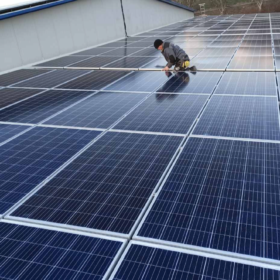Covid-19 weekly round-up: Polish solar is immune to the effects of Covid-19 and the coronavirus will drive EV manufacturing from China to India, apparently

Plus, one Australian installer says residents who had installed solar and storage at home will be cushioned against thumping, coronavirus-related electricity bill rises this quarter and there are signs of recovery in overall energy consumption levels.
Vaibhav Pratap Singh, a senior analyst at South Asian thinktank the Council for Energy, Environment and Water (CEEW) has told pv magazine India the small scale solar market will be depressed by the economic fall-out from the Covid-19 crisis and larger project deployment will be muted in the short-term, due to supply chain disruption and lower energy demand. Indian renewables companies can be expected to sell off stakes to raise funds, said Singh, and most of the post-Covid economic recovery packages being instituted by governments have few, if any, green conditions attached.
U.K. analyst Cornwall Insight has reported energy demand has started to recover in the nation with the easing of Covid-19 lockdown restrictions to sit around 10% down on the five-year average during the first nine days of this month. The analyst said usage could have risen further with the opening of non-essential retailers on Monday last week but is unlikely to fully recover while some lockdown measures remain and amid poor economic forecasts.
Industry group the National Solar Energy Federation of India has called for the waiver of grid charges afforded to renewable energy projects commissioned before December 2022 to be extended by a year to help the industry through the Covid-19 crisis. Under the waiver, renewables projects secure a 25-year exemption from charges applied by the interstate electric transmission system.
Aviation fuel
Although electricity demand was down 21% during April, the Irish energy authority has said the first full month of Covid-19 lockdown most heavily affected transport fuels, with kerosene for air travel down 84% from the volume recorded in April last year. Petrol deliveries were down 55% in April, year-on-year, and diesel 52%, reported the Sustainable Energy Authority for Ireland on Monday. Deliveries of kerosene for heating, however, were up 86% in March, year-on-year, and 68% in April, driven by stockpiling related to lockdown concerns and a low oil price.
Polish PV industry body PV Poland has stated the solar industry in the nation is “somehow immune” to the coronavirus crisis after 43,000 small scale systems were installed during the first quarter to add 312 MWp of new generation capacity. Poland did not bring in Covid-19-related social distancing and travel restrictions until March 25, with the measures tightened to full, on-street requirements on March 31-April 1.
Australian PV installer Natural Solar has estimated households used 105% more residential electricity during the first quarter, thanks to the Covid-19 lockdown. The data came from live monitoring systems nationwide and related to thousands of homes, with the installer adding, homeowners with solar panels and energy storage would be cushioned from a significantly higher quarterly electricity bill.
Recovery
Belgian electric transmission system operator (TSO) Elia last week said energy consumption had recovered to 5% off the five-year average for the time of year in the nation after falling an average of 17% lower in early April, thanks to Covid-19 shutdowns, and hitting 25-30% below the typical volume at certain points. The TSO said the electricity price was also recovering after hitting an all-time low of €14.70/MWh in April.
The latest U.S. Department of Energy figures showed solar shipments slipped from a record of 2.05 GW in March – possibly boosted by supply chain fears as Covid-19 hit China – to 1.24 GW in April, as the new coronavirus landed in the States. Supply chain fears may also explain the average solar module price of $0.46/W (€0.41) in February, which slid to $0.37 in March and April.
India can exploit the global lack of enthusiasm for Chinese supply chains caused by the Covid-19 crisis to become a world manufacturing hub for electric vehicles within five years, according to road transport minister Nitin Gadkari.

